Exploring the New ConsenSys zkEVM: The Power of Zero-Knowledge Proofs


As blockchain technology continues to evolve, developers are constantly searching for ways to enhance its capabilities. Enter the ConsenSys zkEVM – a new innovation that has the potential to revolutionize the industry. This cutting-edge technology utilizes zero-knowledge proofs blockchain, a powerful cryptographic tool that allows for secure and private transactions on the blockchain. With the zkEVM, developers now have the ability to create smart contracts that are completely private, without sacrificing the trust and transparency that blockchain technology is known for. In this article, we’ll explore the power of zero-knowledge proofs and the ways in which the ConsenSys zkEVM is changing the game for blockchain developers. From its benefits to its limitations, we’ll dive deep into this exciting new technology and what it means for the future of blockchain. So, let’s take a closer look at the ConsenSys zkEVM and what it has to offer.

What are zero-knowledge proofs?
Zero-knowledge proofs are a type of proof that allows one party (the prover) to demonstrate to another party (the verifier) that they know a certain piece of information without revealing anything else about that information. In other words, zero-knowledge proofs allow for authentication without disclosure.
In a zero-knowledge proof, the prover convinces the verifier that they know a solution to a problem or possess a secret without revealing any information about the solution or secret itself. The verifier can then verify the proof without learning anything else about the solution or secret.
Zero-knowledge proofs have important applications in cryptography and computer science, including password authentication, digital signatures, and secure communication. They allow for secure authentication and verification without revealing sensitive information, providing an important tool for protecting privacy and security.
How does ConsenSys zkEVM work?
ConsenSys zkEVM is a privacy-focused implementation of the Ethereum Virtual Machine (EVM) that enables developers to build and deploy smart contracts that utilize zero-knowledge proofs for privacy and confidentiality. Here’s how it works:
- Programmers write smart contracts in Solidity or Vyper, just like they would for the standard Ethereum blockchain.
- When the contract is deployed on the zkEVM, it is compiled into a circuit using a tool called “Cairo.” The circuit is optimized for zero-knowledge proofs and is designed to execute in a private, secure environment.
- Users interact with the contract using a special “shielded” wallet that allows them to generate and verify zero-knowledge proofs.
- When a user submits a transaction to the zkEVM, the system generates a zero-knowledge proof that the transaction is valid and authorized by the user.
- The zkEVM executes the transaction and updates the state of the contract, just like a standard Ethereum contract.
- The system generates a new zero-knowledge proof that proves the updated state of the contract without revealing any confidential information.
The result is a private and secure execution environment for smart contracts that allows for confidentiality, privacy, and scalability. Developers can use zkEVM to build applications that require confidential data or complex computations without exposing sensitive information to unauthorized parties.
Benefits of using ConsenSys zkEVM
There are several benefits to using ConsenSys zkEVM, including:
- Privacy: zkEVM enables developers to build and deploy smart contracts that use zero-knowledge proofs to keep data and transactions confidential. This is especially useful for applications that handle sensitive or private data, such as healthcare or financial services.
- Scalability: By leveraging zero-knowledge proofs, zkEVM can increase transaction throughput and reduce gas costs compared to the standard Ethereum blockchain.
- Interoperability: Since zkEVM is compatible with standard Ethereum tools and smart contract languages, developers can easily migrate existing contracts or build new ones using Solidity or Vyper.
- Security: zkEVM uses a private, secure execution environment that reduces the risk of hacks and attacks while maintaining the integrity and correctness of the blockchain.
- Compliance: zkEVM enables developers to build applications that comply with regulations and privacy laws, such as GDPR, HIPAA, and CCPA.
ConsenSys zkEVM provides developers with a powerful tool for building and deploying privacy-focused smart contracts that enable new use cases and applications that were previously impossible on the standard Ethereum blockchain.
Real-world applications of ConsenSys zkEVM
ConsenSys zkEVM has many potential real-world applications, including:
- Financial services: zkEVM can be used to build privacy-focused applications for financial services, such as confidential asset transfers, private trading, and secure loans.
- Healthcare: Healthcare providers can use zkEVM to build applications that securely manage and share patient health data while maintaining patient privacy.
- Supply chain management: By using zkEVM, supply chain managers can build applications that enable secure and confidential data sharing between parties, reducing the risk of fraud and counterfeiting.
- Gaming: Gaming companies can use zkEVM to build blockchain-based games that leverage zero-knowledge proofs to enable private, secure transactions and user data management.
- Decentralized finance (DeFi): zkEVM can be used to build privacy-focused DeFi applications, such as anonymous lending and borrowing, confidential trading, and secure prediction markets.
- Identity management: By leveraging zero-knowledge proofs, zkEVM can enable users to prove their identity or authenticate transactions without revealing personal information.
- Government and public sector: Governments and public sector organizations can use zkEVM to build applications that enable secure data sharing between agencies, reduce fraud and corruption, and protect sensitive information.
ConsenSys zkEVM provides a powerful tool for building privacy-focused blockchain applications that enable new use cases and applications across a range of industries and sectors.
Comparison with other blockchain technologies
Compared to other blockchain technologies, ConsenSys zkEVM has several distinct advantages and disadvantages.
Advantages:
- Privacy: ConsenSys zkEVM is designed with privacy as a primary feature, enabling developers to build and deploy smart contracts that utilize zero-knowledge proofs for confidentiality and privacy.
- Scalability: By leveraging zero-knowledge proofs, zkEVM can increase transaction throughput and reduce gas costs compared to the standard Ethereum blockchain, making it a more scalable option for high-volume applications.
- Interoperability: Since zkEVM is compatible with standard Ethereum tools and smart contract languages, developers can easily migrate existing contracts or build new ones using Solidity or Vyper.
- Security: zkEVM uses a private, secure execution environment that reduces the risk of hacks and attacks while maintaining the integrity and correctness of the blockchain.
Disadvantages:
- Complexity: Using zero-knowledge proofs requires a high degree of technical expertise and can be complex and time-consuming to implement.
- Limited adoption: As a relatively new technology, ConsenSys zkEVM has limited adoption and a smaller developer community compared to other blockchain technologies.
- Centralization: While zkEVM is designed to be decentralized, the use of trusted setup ceremonies to generate zero-knowledge proofs may introduce a level of centralization and require trust in third-party entities.
- Performance: While zkEVM offers improved scalability compared to the standard Ethereum blockchain, it may not be as performant as other blockchain technologies designed specifically for high-performance applications.
ConsenSys zkEVM provides a unique set of features and advantages for developers looking to build privacy-focused smart contracts. However, it is important to carefully consider the technology’s limitations and suitability for specific use cases when compared to other blockchain technologies.
Challenges and limitations of ConsenSys zkEVM
Like any new technology, ConsenSys zkEVM has its share of challenges and limitations. Some of the key challenges and limitations include:
- Complexity: zkEVM requires a high degree of technical expertise to use and develop, making it challenging for many developers to implement.
- Limited adoption: As a new technology, zkEVM has limited adoption and a smaller developer community compared to more established blockchain technologies.
- Centralization: The use of trusted setup ceremonies to generate zero-knowledge proofs may introduce a level of centralization and require trust in third-party entities.
- Performance: While zkEVM offers improved scalability compared to the standard Ethereum blockchain, it may not be as performant as other blockchain technologies designed specifically for high-performance applications.
- Integration challenges: Integrating zkEVM with existing systems and infrastructure can be challenging, as it requires specialized knowledge and tools.
- Regulatory challenges: Due to the potential for privacy-focused applications built on zkEVM to be used for illicit activities, regulatory challenges, and concerns may arise.
- Limitations in use cases: While zkEVM offers many potential benefits for privacy-focused applications, it may not be suitable for all use cases and may have limitations in certain scenarios.
While ConsenSys zkEVM offers many benefits and advantages for privacy-focused blockchain development, it is important to carefully consider the challenges and limitations before deciding to use the technology. Developers should carefully assess their needs and requirements before choosing a blockchain technology, and consider the trade-offs involved with using a newer, less established technology.
Future of ConsenSys zkEVM
The future of ConsenSys zkEVM looks promising, as it offers a unique set of features and advantages for building privacy-focused blockchain applications. Some potential future developments and use cases for zkEVM include:
- Increased adoption: As more developers become familiar with zkEVM and its capabilities, we can expect to see increased adoption and a larger developer community contributing to the technology.
- New use cases: As developers become more familiar with zkEVM, we can expect to see new and innovative use cases emerge, particularly in the areas of finance, healthcare, and supply chain management.
- Integration with other technologies: As the blockchain ecosystem continues to evolve, we can expect to see more integration between zkEVM and other blockchain technologies, as well as with other technologies such as machine learning and artificial intelligence.
- Improved scalability and performance: As zkEVM matures and becomes more widely adopted, we can expect to see improvements in scalability and performance, enabling developers to build high-performance, high-volume applications.
- Increased regulatory acceptance: As blockchain technology continues to gain acceptance and regulatory frameworks evolve, we can expect to see increased regulatory acceptance and support for privacy-focused blockchain technologies like zkEVM.
The future of ConsenSys zkEVM looks promising, as it offers a unique set of features and advantages for building privacy-focused blockchain applications. As the blockchain ecosystem continues to evolve, we can expect to see new developments and innovations in zkEVM and other blockchain technologies, opening up new possibilities and use cases for decentralized applications.
Getting started with ConsenSys zkEVM
To get started with ConsenSys zkEVM, you will need to have some familiarity with blockchain technology and smart contracts. Here are some steps you can take to get started:
- Learn the basics of blockchain technology: Before getting started with zkEVM, it’s important to have a solid understanding of the basics of blockchain technology, including how it works, its key features, and its potential applications.
- Familiarize yourself with smart contracts: Smart contracts are self-executing contracts with the terms of the agreement between buyer and seller being directly written into lines of code. zkEVM is built on top of the Ethereum blockchain and supports smart contracts, so it’s important to have a good understanding of how they work.
- Set up a development environment: To start developing with zkEVM, you’ll need to set up a development environment that includes the necessary tools and libraries. ConsenSys provides a comprehensive development suite called Truffle Suite, which includes tools like Truffle, Ganache, and Drizzle to help you get started.
- Learn Solidity: Solidity is the primary programming language used to write smart contracts for the Ethereum blockchain, and zkEVM is compatible with Solidity. You’ll need to learn Solidity to start building smart contracts with zkEVM.
- Learn about zero-knowledge proofs: To take advantage of the privacy-focused features of zkEVM, you’ll need to learn about zero-knowledge proofs and how they work.
- Join the community: ConsenSys has an active community of developers working on zkEVM, and joining the community can be a great way to learn more about the technology and get help with any questions or issues you encounter.
By following these steps, you can get started with ConsenSys zkEVM and begin building privacy-focused smart contracts on the Ethereum blockchain.
Wrap up
In summary, ConsenSys zkEVM is a privacy-focused blockchain technology that enables developers to build decentralized applications with enhanced privacy and security. By leveraging zero-knowledge proofs, zkEVM allows users to perform transactions without revealing any sensitive information, making it ideal for use cases in finance, healthcare, and supply chain management.
Some of the key benefits of using zkEVM include improved scalability, enhanced privacy, and greater security. However, like any new technology, zkEVM also has its share of challenges and limitations, including complexity, limited adoption, and performance issues.
Despite these challenges, the future of ConsenSys zkEVM looks promising, as it offers a unique set of features and advantages for building privacy-focused blockchain applications. As more developers become familiar with zkEVM and its capabilities, we can expect to see new use cases emerge and increased adoption and support for this technology.
Overall, ConsenSys zkEVM is a powerful tool for developers looking to build privacy-focused blockchain applications, and by learning the basics of blockchain technology, smart contracts, and zero-knowledge proofs, developers can start taking advantage of zkEVM’s capabilities and build decentralized applications that prioritize privacy and security.
Read more related news:
Disclaimer
In line with the Trust Project guidelines, please note that the information provided on this page is not intended to be and should not be interpreted as legal, tax, investment, financial, or any other form of advice. It is important to only invest what you can afford to lose and to seek independent financial advice if you have any doubts. For further information, we suggest referring to the terms and conditions as well as the help and support pages provided by the issuer or advertiser. MetaversePost is committed to accurate, unbiased reporting, but market conditions are subject to change without notice.
About The Author
Damir is the team leader, product manager, and editor at Metaverse Post, covering topics such as AI/ML, AGI, LLMs, Metaverse, and Web3-related fields. His articles attract a massive audience of over a million users every month. He appears to be an expert with 10 years of experience in SEO and digital marketing. Damir has been mentioned in Mashable, Wired, Cointelegraph, The New Yorker, Inside.com, Entrepreneur, BeInCrypto, and other publications. He travels between the UAE, Turkey, Russia, and the CIS as a digital nomad. Damir earned a bachelor's degree in physics, which he believes has given him the critical thinking skills needed to be successful in the ever-changing landscape of the internet.
More articles

Damir is the team leader, product manager, and editor at Metaverse Post, covering topics such as AI/ML, AGI, LLMs, Metaverse, and Web3-related fields. His articles attract a massive audience of over a million users every month. He appears to be an expert with 10 years of experience in SEO and digital marketing. Damir has been mentioned in Mashable, Wired, Cointelegraph, The New Yorker, Inside.com, Entrepreneur, BeInCrypto, and other publications. He travels between the UAE, Turkey, Russia, and the CIS as a digital nomad. Damir earned a bachelor's degree in physics, which he believes has given him the critical thinking skills needed to be successful in the ever-changing landscape of the internet.



















































